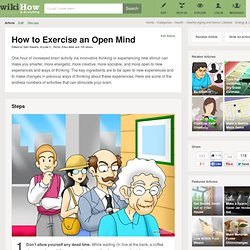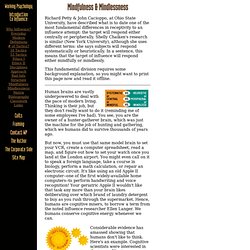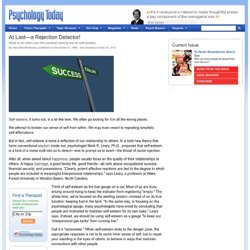

How to Exercise an Open Mind - WikiHow. Edit Article Edited by Sam Rawlins, Krystle C., Richd, Erika Altek and 105 others One hour of increased brain activity via innovative thinking or experiencing new stimuli can make you smarter, more energetic, more creative, more sociable, and more open to new experiences and ways of thinking.

The key ingredients are to be open to new experiences and to make changes in previous ways of thinking about these experiences. Here are some of the endless numbers of activities that can stimulate your brain. Ad Steps 1Don’t allow yourself any dead time. 20Browse something that you are not familiar with the internet. Tips Become more like an inquisitive child. Mindfulness & Mindlessness in Persuasion. Richard Petty & John Cacioppo, at Ohio State University, have described what is to date one of the most fundamental differences in receptivity to an influence attempt: the target will respond either centrally or peripherally.

Shelly Chaiken's research is similar (New York University), although she uses different terms: she says subjects will respond systematically or heuristically. In a sentence, this means that the target of influence will respond either mindfully or mindlessly. This fundamental division requires some background explanation, so you might want to print this page now and read it offline. Human brains are vastly underpowered to deal with the pace of modern living. Thinking is their job, but they don't really want to do it (reminding me of some employees I've had). But now, you must use that same model brain to set your VCR, create a computer spreadsheet, read a map, and figure out how to set your watch once you land at the London airport. Do you notice a pattern here?
Mind Hacks. How to Feel Confident. Edit Article Help Building ConfidenceTricking Your BrainWorking from the Outside InPracticing, Practicing, Practicing Edited by Hannah, DrLynx, Tom Viren, Ben Rubenstein and 92 others You might have already read and learned how to be confident, but what if you still don't feel all that confident?

Sometimes it takes your emotions a little bit of time to catch up with your behaviors, but you can help to move the process along. Perhaps all you really need is some working out and dressing up to feel better, or maybe you can start with thinking positively and smiling more often. Ad Steps Part 1 of 3: Tricking Your Brain. 15 Styles of Distorted Thinking. At Last—a Rejection Detector! Self-esteem, it turns out, is a lot like love.

We often go looking for it in all the wrong places. We attempt to bolster our sense of self from within. We may even resort to repeating simplisitc self-affirmations. But in fact, self-esteem is more a reflection of our relationship to others. In a bold new theory that turns conventional wisdom inside out, psychologist Mark R. After all, when asked about happiness, people usually focus on the quality of their relationships to others. Think of self-esteem as the fuel gauge on a car. Call it a "sociometer. " Like, check your own behavior for things that could be turning people off. Happiness: From the Praise of Others The sociometer is built into us not just because we are happiest when basking in the acceptance and praise of others—but because without them we wouldn't have survived in the first place. "Our ideology of individualism forces us to buck this internal monitor," he points out. Outsize Attempts at Repair. 47 Mind-Blowing Psychology-Proven Facts You Should Know About Yourself.
I’ve decided to start a series called 100 Things You Should Know about People.

As in: 100 things you should know if you are going to design an effective and persuasive website, web application or software application. Or maybe just 100 things that everyone should know about humans! The order that I’ll present these 100 things is going to be pretty random. So the fact that this first one is first doesn’t mean that’s it’s the most important.. just that it came to mind first. Dr. <div class="slide-intro-bottom"><a href=" class="sl-start"> »</a></div> Psychological ("personality") Types.
Psychological ("personality") Types According to Jung's theory of Psychological Types we are all different in fundamental ways.

One's ability to process different information is limited by their particular type. These types are sixteen. People can be either Extroverts or Introverts, depending on the direction of their activity ; Thinking, Feeling, Sensing, Intuitive, according to their own information pathways; Judging or Perceiving, depending on the method in which they process received information. Extroverts vs. Extroverts are directed towards the objective world whereas Introverts are directed towards the subjective world. Sensing vs. Sensing is an ability to deal with information on the basis of its physical qualities and its affection by other information. Thinking vs. Thinking is an ability to deal with information on the basis of its structure and its function. Perceiving vs.
Perceiving types are motivated into activity by the changes in a situation. ENTp , ISFp , ESFj , INTj , ENFj.